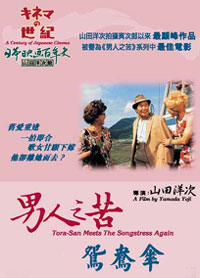 The fifteenth feature-film Tora-san episode Otoko wa tsurai yo: Torajiro aiaigasa (Shochiku, 1975) is truly one of the finest in the very long-running dramedy series about a misfit vagabond vendor of shoddy trinkets. The fifteenth feature-film Tora-san episode Otoko wa tsurai yo: Torajiro aiaigasa (Shochiku, 1975) is truly one of the finest in the very long-running dramedy series about a misfit vagabond vendor of shoddy trinkets.
In its premiere in the US back in 1976 the subtitled print was shown as Tora-san: Love Under One Umbrella, taking advantage of an old Japanese symbol of love.
Akin to writing one's initials in a heart carved on a tree, in Japan a simple umbrella is carved or drawn with the names of the couple on each side of the umbrella handle. And in art & cinema, anyone who shares an umbrella symbolize, on one level or another, lovers.
The film was also shown in the US as Tora-san's Rise & Fall, then decades years later a sparkling new subtitled print was released as Tora San Meets the Songstress Again.
This played at New York's Japan Society as part of a 2008 "Best of Tora-san" festival celebrating forty years since the first Tora-san episode, consisting of the eight episodes which Yoji Yamada (who wrote & directed all but two of the forty-eight films in the series) personally selected as the best.
 The new print also played in 2008 at the Hawaiian International Film Festival, at the Montreal World Film Festival, & a few other places. The new print also played in 2008 at the Hawaiian International Film Festival, at the Montreal World Film Festival, & a few other places.
So the newest English title Tora-san Meets the Songstress Again is apt to be regarded the primary English title from now on, especially as it also had a dvd release under the same title, from Poker Industries, subtitled(in English & Chinese.
Yoji Yamada (who would later in his career lead the jidai-geki revival with humanist samurai films beginning with Twilight Samurai, 2002) always maintained a surprisingly high level of quality. Every episode is heartwarming, sad, funny, & Torajira always remains maddening & loveable, just shy of outright scoundrel, an arch failure who cannot adjust to the modern world in his familiar outmoded hat & tummy-warmer.
The scripts often show an awareness that the same story is being told over & over again, but this repetition is successfully conveyed as a peculiarity, perhaps a mania, of Tora himself.
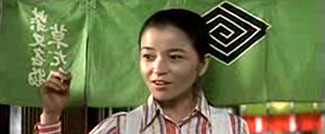 Even his loving sister Sakura (played by Chieko Baisho as the sister everyone could wish for) roles her eyes when he starts again with misguided romantic dreams. Even his loving sister Sakura (played by Chieko Baisho as the sister everyone could wish for) roles her eyes when he starts again with misguided romantic dreams.
One thread of the plot regards "Hyodo" or Pappy (Eiji Funakoshi), an odd friend of Torajiro's from Tokyo, who tosses aside his success as a corporate man & journeys with Tora north to Hokkaido.
Ostensibly Hyodo's journey is so Hyodo can find his own sweetheart from youth, but really it is a fantasy of abandoning all one's responsiblities & joining Tora on the road, which was probably every salaryman's fantasy when this film series was being made.
As played by Kiyoshi Atsumi, Torajiro represented that aspect of Japanese manhood which every man worries lies just beneath the surface. Every "successful" salaryman had something in his rarely displayed emotions that felt at odds with the modern world, even without being the abject failure that Tora remained.
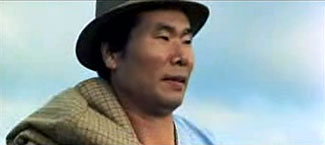 Post-war Japan was a place where God (the Emperor) was no longer God, & feudal values, having brought Japan to its knees, meant meant absolutely everything had to change. Post-war Japan was a place where God (the Emperor) was no longer God, & feudal values, having brought Japan to its knees, meant meant absolutely everything had to change.
Japan arose from its ashes as a world power commercially, but no one of that generation had sufficient time to so adjust that they felt totally in their mileau.
Such I believe is the center of why feckless gentle Tora, a failure at business & love & at everything he ever pursues, was held so close to the hearts of the public. And at a time when Japanese films were losing audiences, each new episode of Tora-san had families lining up around the block.
Another element of the series was how each story conveyed an element of traditional Japan surviving, & that element was not samurai but a romantic view of common people's lives.
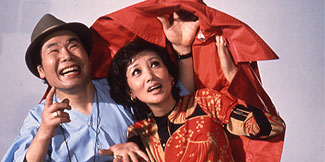 The street where Tora grew up in Shimabata (a suburb of Tokyo) was just a little alleyway of charming storefronts, run by families who lived in back or upstairs. The street where Tora grew up in Shimabata (a suburb of Tokyo) was just a little alleyway of charming storefronts, run by families who lived in back or upstairs.
This street could've existed exactly as shown in the Meiji era or even the Tokugawa era. Here life remained as it always was for the common people of old Edo, though only in the most utopianized nostalgic revisions of factg.
The sad reality is there is no one in modern Japan who can ever return to such a perfect home, & this one vagabond tramp, Torajiro, who owns nothing & achieves nothing, in reality possesses this one great thing: this changeless home in Shimabata that waits forever for his return.
His uncle Tatsuzo & aunt Tsune (Masami Shimojo & Chieko Misaki), together with his sister, run an open-fronted candy store. In each episode, wandering Tora returns to this beautiful business/home, embraced joyfully by a family who loves him dearly, though inevitably his screw-ups disappoint them afresh & he must leave with his usual sense of shame. But the significant thing is there is this place that anchors his soul to family & home, to a street where old Japan echoes into the modern age with no dark aspect.
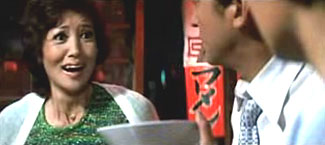 In Tora San Meets the Songstress Again, as often "almost" occurs, he has fresh hopes of settling down.
In Tora San Meets the Songstress Again, as often "almost" occurs, he has fresh hopes of settling down.
In many episodes he falls for some young girl who sees him as an uncle or brother or devoted friend but rarely the romantic partner he always hopes he can become; or who does love him but has commanding obligations; or for whatever reason, it cannot work out.
This time he meets up with Lili, a woman with whom he has considerable history, a sweetheart from the past. Tora feels an anguished nostalgia for those past times.
He rushes to the candy shop to tell his family about her beautiful eyes, her wonderful figure, how audiences love to hear her sing & exclaim, "How pretty!" Oh for sure Tora-san's in love.
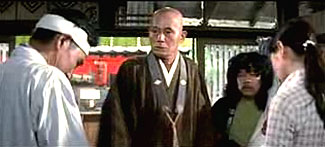 His family's priest (Chishu Ryu) becomes annoyed, having seen him with Lili behaving shamelessly in public, & assumes an illicit relationship if they're not married. His family's priest (Chishu Ryu) becomes annoyed, having seen him with Lili behaving shamelessly in public, & assumes an illicit relationship if they're not married.
This priest in episode after episode has Tora's well-being in mind, but Tora's nature is too obvious, His inability to really achieve a better path can make even a forebearing holy man short tempered.
This wonderful woman as played by Ruriko Asaoka really does seem suited to Tora. Not only is she closer than usual to age-appropriate, but like Torajiro himself, she's a detached spirit, wandering from place to place.
Surely we know it can't work out for Tora or the series would've ended here, but it is one of Yoji Yamada's great tricks as writer & director that he can keep us hoping, make us believe that for once things might work out for Tora-san. And as Lili seems authentically eager to marry him, Tora's ultimate failure will be on rather different grounds than usual.
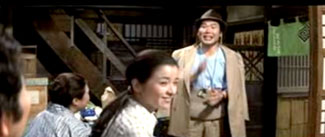 A final mediation on the series: One might expect such a dramatic comedy series reliant on nostalgia would be so Japan-specific that it would be less successful for western viewers. But there really is something universal about Torajiro. A final mediation on the series: One might expect such a dramatic comedy series reliant on nostalgia would be so Japan-specific that it would be less successful for western viewers. But there really is something universal about Torajiro.
He could be Beaver Cleaver from Leave it to Beaver grown up, with a family life behind him that came right out of America's own dreams of a suburban heaven that never existed in reality. I can imagine the Beav having grown up a schlub selling Fuller Brushes or junior encyclopedias or family bibles door-to-door across America, visiting his parents Ward & June & his brother Wally once or twice a year, letting them down anew, & setting out with his satchel of sales samples until next time.
And thought I can't think off hand of a film or series exactly like Tora-san made in America, this idea of the Beav growing up to be a vagabond salesman nevertheless feels familiar.
 Or perhaps the parallel would be someone more wholeheartedly working class like Riley from the Life of Riley or Ralph from The Honeymooners, if they'd been selling bibles throughout the deep south instead of scoring families they seem scarcely to have earned. Or perhaps the parallel would be someone more wholeheartedly working class like Riley from the Life of Riley or Ralph from The Honeymooners, if they'd been selling bibles throughout the deep south instead of scoring families they seem scarcely to have earned.
That these comparisons are from the 1950s shows the nostalgic nature of Tora-san. And this illusive dream of a simpler kinder world of the a past (yet within memory) is by no means peculiar to Japan.
I'm not easily won over by comedic tearjerker tales, but Torajiro gets to me every time. When in the fifteenth episode we again we get to hear Tora sing (on the soundtrack) the beautiful enka folksong which is the theme song for the series, the sound of it can still touch my heart for love of this unbelievably fine series:
"I'm as worthless as a yakuza, I know, beloved sister/ Someday I want to be the brother you can be proud of/ My hustling & struggles never come together/ And another sun rises & sets upon our tears/ Another sun sets."
copyright © by Paghat the Ratgirl
|
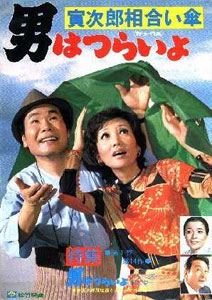

 The new print also played in 2008 at the Hawaiian International Film Festival, at the Montreal World Film Festival, & a few other places.
The new print also played in 2008 at the Hawaiian International Film Festival, at the Montreal World Film Festival, & a few other places. Even his loving sister Sakura (played by Chieko Baisho as the sister everyone could wish for) roles her eyes when he starts again with misguided romantic dreams.
Even his loving sister Sakura (played by Chieko Baisho as the sister everyone could wish for) roles her eyes when he starts again with misguided romantic dreams. Post-war Japan was a place where God (the Emperor) was no longer God, & feudal values, having brought Japan to its knees, meant meant absolutely everything had to change.
Post-war Japan was a place where God (the Emperor) was no longer God, & feudal values, having brought Japan to its knees, meant meant absolutely everything had to change. The street where Tora grew up in Shimabata (a suburb of Tokyo) was just a little alleyway of charming storefronts, run by families who lived in back or upstairs.
The street where Tora grew up in Shimabata (a suburb of Tokyo) was just a little alleyway of charming storefronts, run by families who lived in back or upstairs.
 His family's priest (Chishu Ryu) becomes annoyed, having seen him with Lili behaving shamelessly in public, & assumes an illicit relationship if they're not married.
His family's priest (Chishu Ryu) becomes annoyed, having seen him with Lili behaving shamelessly in public, & assumes an illicit relationship if they're not married.
 Or perhaps the parallel would be someone more wholeheartedly working class like Riley from the Life of Riley or Ralph from The Honeymooners, if they'd been selling bibles throughout the deep south instead of scoring families they seem scarcely to have earned.
Or perhaps the parallel would be someone more wholeheartedly working class like Riley from the Life of Riley or Ralph from The Honeymooners, if they'd been selling bibles throughout the deep south instead of scoring families they seem scarcely to have earned.